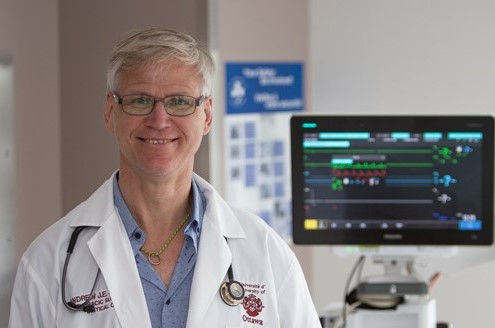 “Currently, one in every seven ICU patients experiences extubation failure. Prolonged ventilation harms patients, and early extubation requiring reintubation can be a devastating blow to their recovery,” says Dr. Andrew Seely. “We’ve developed the first medical device to offer extubation decision support, which we believe will help standardize and improve care.”An innovative tool developed by researchers at The Ottawa Hospital is closer to helping critically ill patients following its approval by Health Canada.
“Currently, one in every seven ICU patients experiences extubation failure. Prolonged ventilation harms patients, and early extubation requiring reintubation can be a devastating blow to their recovery,” says Dr. Andrew Seely. “We’ve developed the first medical device to offer extubation decision support, which we believe will help standardize and improve care.”An innovative tool developed by researchers at The Ottawa Hospital is closer to helping critically ill patients following its approval by Health Canada.
The tool addresses the major challenge of determining when a patient on a breathing machine is ready to breathe on their own. This is a high-stakes decision because the longer a patient stays on a breathing tube, the more difficult it is for them to recover, but if the tube is removed too early, it may have to be reinserted. This can be devastating for the patient and their family and is associated with worse outcomes and higher hospital costs.
The new tool, developed by Dr. Andrew Seely, uses artificial intelligence to analyze patterns in patient vital sign data to help predict when a patient is ready to breathe on their own. A promising pilot study at TOH is expected to be published in the coming year and a randomized trial in 10 hospitals is expected to start soon.
In addition to his role as a critical care physician, surgeon and scientist at The Ottawa Hospital and uOttawa, Dr. Seely is also CEO of Therapeutic Monitoring Systems, which is commercializing this research.
The Ottawa Hospital is a leading academic health, research and learning hospital proudly affiliated with the University of Ottawa. All researchers at The Ottawa Hospital follow a Responsible Innovation framework for developing and commercializing innovations in a responsible way.
